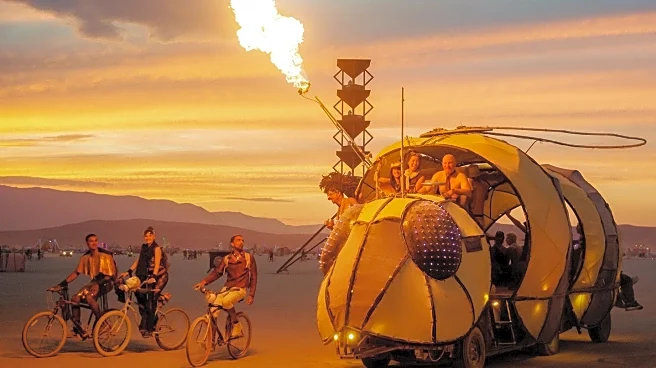What's Happening?
Burning Man, now a globally recognized event, traces its origins back to Baker Beach in San Francisco, where it began in 1986. Initially a small gathering of 20 friends, the event was founded by Larry Harvey, who burned an eight-foot wooden structure
known as 'the Man.' The event grew in popularity, with attendance reaching 300 by 1989, facilitated by the Cacophony Society's mailing list. However, local law enforcement halted the burning due to the lack of a fire permit, prompting the event's relocation to Nevada in 1990. Since then, Burning Man has evolved into a major cultural phenomenon, with tens of thousands of participants attending annually.
Why It's Important?
Understanding the origins of Burning Man provides insight into its cultural significance and the values it promotes, such as community, creativity, and self-expression. The event's growth from a small beach gathering to a large-scale desert festival reflects broader societal shifts towards alternative lifestyles and communal experiences. The relocation to Nevada allowed Burning Man to expand and develop its unique culture, which has influenced art, music, and community-building practices worldwide. The event's history underscores the importance of adaptability and innovation in cultural movements.
What's Next?
As Burning Man continues to evolve, its organizers may focus on expanding its cultural and environmental initiatives. The event's principles could inspire new forms of community engagement and artistic expression. The ongoing dialogue between Burning Man and local authorities will be crucial in ensuring the event's sustainability and compliance with regulations. Future iterations of Burning Man may explore new themes and artistic collaborations, further enriching the participant experience.
Beyond the Headlines
Burning Man's impact extends beyond the event itself, influencing global cultural trends and fostering a sense of community among participants. The event's emphasis on radical inclusion and decommodification challenges traditional societal norms and encourages alternative forms of social interaction. Burning Man's success in creating a temporary, self-sustaining community could serve as a model for other events seeking to balance cultural expression with ecological responsibility.
















